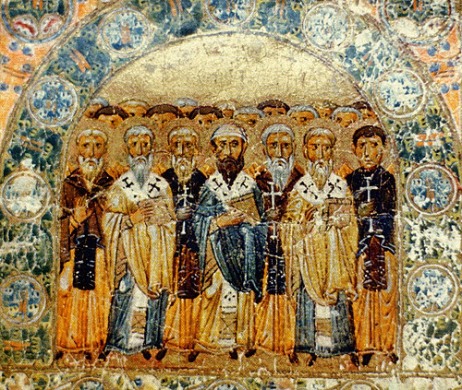Patristic Lectionary, Night Office,
Habakkuk 1:1-2:4 - Bible Gateway
https://www.biblegateway.com/passage/?search=Habakkuk%201:1-2:4
The prophecy that Habakkuk the prophet received. Habakkuk'sComplaint - How long, LORD, must I call for help, but you do not listen? Or cry out to.
please set it ablaze with the fire of your love!
TWENTY-NINTH WEEK IN ORDINARY TIME
WEDNESDAY
First Reading
Habakkuk 1:1 - 2:4
Responsory Rom 1:16-17; 5:1
I am not ashamed of the gospel: it is the power of God saving all who have faith, Jews first, but also Greeks. + As scripture says: The righteous find life through faith.
V. Since we are justified by faith, we have peace with God through our Lord Jesus Christ. + As scripture ...
Second Reading
From a commentary by Denis the Carthusian (1408-1471)
Whoever is truly Christian has to say: I
will stand on my guard, that is, I will stand guard over my heart
with my mind fully alert, so as to keep it pure and offer it as a worthy
dwelling-place for God, following the example of him who says: I said, "l
will keep watch over my ways." Solomon
says: Guard your heart with great vigilance,
for it is the source of all life; and Ecclesiasticus: Unless you keep yourself constantly in the fear of
the Lord, your house will soon be overthrown. Moses therefore urges in Deuteronomy:
Keep a careful watch over yourself so as not to forget the words of the Lord your God, or let
them pass out of your mind all the days of your life. For purity of heart, which is nothing but unmixed contemplative delight or
delightful and innocent contemplation of God, is the aim of all our asceticism:
it is for this that we curb our outward senses, our tongues, and our appetites.
We ought therefore to be continually intent on obtaining, preserving and perfecting
our purity of heart, mindful of the Saviour’s words:
Blessed are the pure of heart, for they shall see God.
Remembrance of the presence of God undoubtedly contributes
more than anything else toward this watchfulness; hence the Psalmist says: I have kept your commandments and your precepts, for my whole life lies open
before you. Let us, then, follow in his footsteps and do as the
Apostle taught the Philippians: Work for your salvation with
fear and trembling.
And I will station myself, that is, I will control the motions or impulses of my heart, and stand
firmly on the ramparts, that is, the fortifications,
strengthening the defenses of my soul, always making sure that it is armed, so
that it may never be conquered by the enemies of its salvation, never overcome
by sin or passion. Accordingly, the Apostle warns the Ephesians to put on the whole armour of God, so as to be able to withstand the wiles of the devil.
And I will watch, that is,
concentrate my mind, in order to see, which means to understand, what he will say to me, that is, what God will command me in the scriptures, what encouragement he will
give me, what counsel, and also what his deputies, such as prelates and doctors,
will order and preach. I will also listen to what the Lord God says in my heart
with his own voice, or through the angelic spirit. Thus it is said in Proverbs:
Listen to instruction, my son; for by listening the wise
will grow wiser, and the intelligent receive guidance.
Responsory Ps 119:97.105.135; 19:11
Lord, how I
love your law! Your word is a lamp for my feet, a light for my path. t Let your face shine on your servant and teach
me your decrees.
V. By them
your servant is instructed; in keeping them there is great reward. t Let your face ...
Thursday of the Twenty-ninth week in Ordinary Time
Denis the Carthusian (1402 - 1471), monk
Commentary on St Luke's Gospel; Opera omnia 12, 72 (©Friends of Henry Ashworth)
“Peace I leave with you; my peace I give to you” (Jn 14,27)
Do you think that I have come to bring peace on earth? In other words: “Do not imagine that I have come to offer people a sensual, worldly, and unruly peace that will enable them to be united in their vices and achieve earthly prosperity. No, I tell you, I have not come to offer that kind of peace, but rather division - a good, healthy kind of division, physical as well as spiritual. Love for God and desire for inner peace will set those who believe in me at odds with wicked men and women, and make them part company with those who would turn them from their course of spiritual progress and from the purity of divine love, or who attempt to hinder them.”
Good, interior, spiritual peace consists in the repose of the mind in God, and in a rightly ordered harmony. To bestow this peace was the chief reason for Christ's coming. This inner peace flows from love. It is an unassailable joy of the mind in God, and it is called peace of heart. It is the beginning and a kind of foretaste of the peace of the saints in heaven - the peace of eternity.
Good, interior, spiritual peace consists in the repose of the mind in God, and in a rightly ordered harmony. To bestow this peace was the chief reason for Christ's coming. This inner peace flows from love. It is an unassailable joy of the mind in God, and it is called peace of heart. It is the beginning and a kind of foretaste of the peace of the saints in heaven - the peace of eternity.
http://dailygospel.org/main.php?language=AM&module=commentary&localdate=20151022&id=1410





![[St. Symeon the New Theologian]](http://www.stsymeon.com/symeon.jpg)

